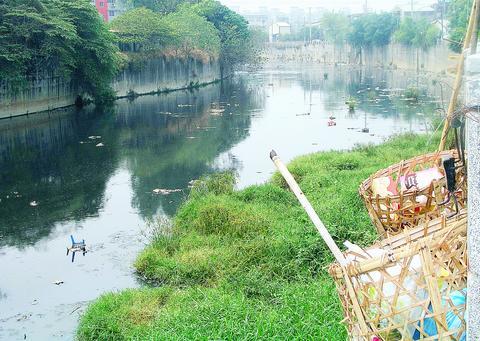Illegal leather tanning factories along Fengshan River (
EPA Administrator Chang Juu-en (

PHOTO: CHAI CHING-HUA, TAIPEI TIMES
At the ceremony, also attended by Kaohsiung County Commissioner Yang Chiu-hsing (楊秋興), Fengshan Mayor Lin San-lang (林三郎), and Chinese Nationalist Party (KMT) Legislator Lin Yi-shih (林益世), clear water was poured into the river to symbolize the river's future vitality.
"Staff of environmental agencies at all levels will inspect illegal tanning factories in order to revive the Fengshan River," Chang said.
Originating in the mountainous areas of Kaohsiung County, the river passes through Fengshan City, population 300,000, before entering neighboring Kaohsiung City.
The commissioner said that three or four decades ago, when its water was still clean, the river was a popular place for swimmers. However, now it is notorious for being heavily polluted by household sewage and industrial wastewater.
"To make the river accessible, restoration projects will include planting trees, paving paths for recreational walkers, and building sewer systems," Yang said.
In the county, a sewage treatment plant will be completed by April next year to intercept polluted waters.
EPA officials said that for decades the waters of the 20km Fengshan River have been polluted by waste water from illegal leather tanning factories.
Since 2002, the river has been listed as one of the nation's 13 most seriously polluted rivers ranked as deserving comprehensive treatment.
According to Leu Horng-guang (
As a result, three registered factories were penalized for discharging untreated wastewater, four illegal tanning factories were shut down, and two illegal wells used by tanning factories were closed.
After visiting the river yesterday, Leu said that treating the river was urgent.
"The river water I observed under the scorching sun in the south was even bubbling," Leu told the Taipei Times.
According to Leu, in 2004 and 2005 the EPA will allocate the local authority about NT$400 million to carry out restoration work along a 5km section of the river near Fengshan City.
The first stage of this work will be completed by the end of next year.
Downstream, the river crosses the border into Kaohsiung City and runs through the industrial zones of the city. It was once so heavily polluted that no fish could survive in it.
Several years ago, however, the Kaohsiung City government built a sewer system to intercept the polluted water. Currently, about 300,000 metric tons of polluted river water are diverted to a municipal sewage treatment plant daily.

Alain Robert, known as the "French Spider-Man," praised Alex Honnold as exceptionally well-prepared after the US climber completed a free solo ascent of Taipei 101 yesterday. Robert said Honnold's ascent of the 508m-tall skyscraper in just more than one-and-a-half hours without using safety ropes or equipment was a remarkable achievement. "This is my life," he said in an interview conducted in French, adding that he liked the feeling of being "on the edge of danger." The 63-year-old Frenchman climbed Taipei 101 using ropes in December 2004, taking about four hours to reach the top. On a one-to-10 scale of difficulty, Robert said Taipei 101

Taiwanese and US defense groups are collaborating to introduce deployable, semi-autonomous manufacturing systems for drones and components in a boost to the nation’s supply chain resilience. Taiwan’s G-Tech Optroelectronics Corp subsidiary GTOC and the US’ Aerkomm Inc on Friday announced an agreement with fellow US-based Firestorm Lab to adopt the latter’s xCell, a technology featuring 3D printers fitted in 6.1m container units. The systems enable aerial platforms and parts to be produced in high volumes from dispersed nodes capable of rapid redeployment, to minimize the risk of enemy strikes and to meet field requirements, they said. Firestorm chief technology officer Ian Muceus said

MORE FALL: An investigation into one of Xi’s key cronies, part of a broader ‘anti-corruption’ drive, indicates that he might have a deep distrust in the military, an expert said China’s latest military purge underscores systemic risks in its shift from collective leadership to sole rule under Chinese President Xi Jinping (習近平), and could disrupt its chain of command and military capabilities, a national security official said yesterday. If decisionmaking within the Chinese Communist Party has become “irrational” under one-man rule, the Taiwan Strait and the regional situation must be approached with extreme caution, given unforeseen risks, they added. The anonymous official made the remarks as China’s Central Military Commission Vice Chairman Zhang Youxia (張又俠) and Joint Staff Department Chief of Staff Liu Zhenli (劉振立) were reportedly being investigated for suspected “serious

Nipah virus infection is to be officially listed as a category 5 notifiable infectious disease in Taiwan in March, while clinical treatment guidelines are being formulated, the Centers for Disease Control (CDC) said yesterday. With Nipah infections being reported in other countries and considering its relatively high fatality rate, the centers on Jan. 16 announced that it would be listed as a notifiable infectious disease to bolster the nation’s systematic early warning system and increase public awareness, the CDC said. Bangladesh reported four fatal cases last year in separate districts, with three linked to raw date palm sap consumption, CDC Epidemic Intelligence